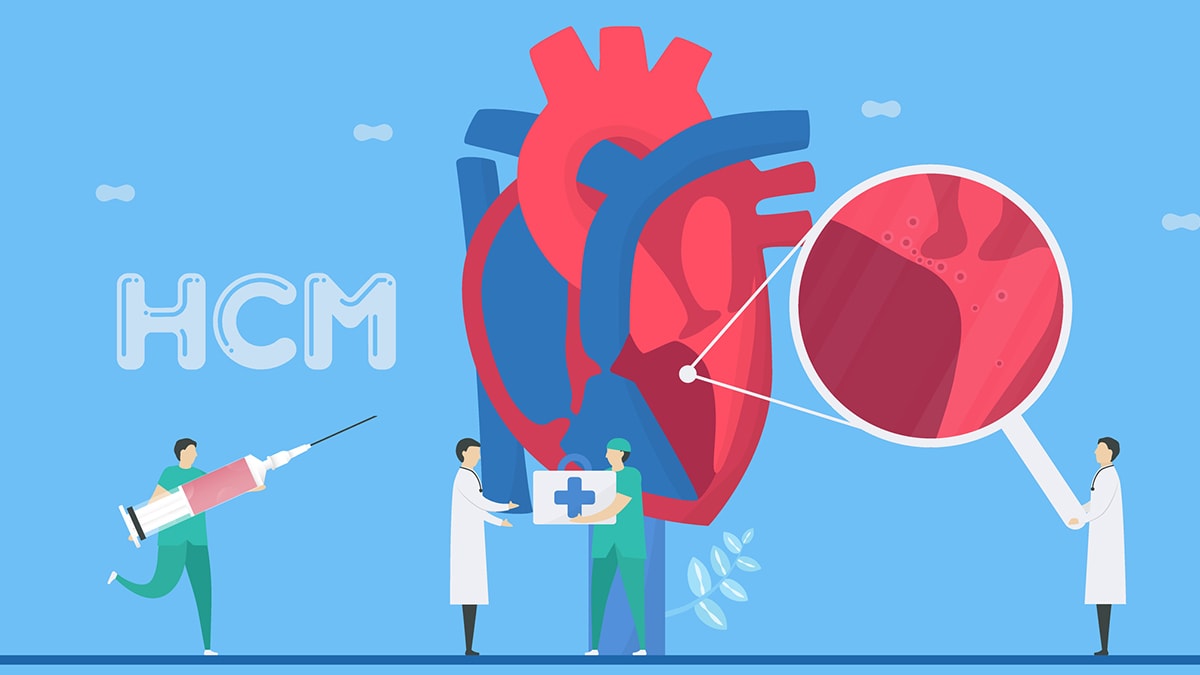Key points
- If you have a family member who died suddenly before age 40, let your healthcare provider know.
- You might need to be screened for hypertrophic cardiomyopathy (HCM), a genetic condition that causes the heart muscle to become thick and can lead to sudden death.
- Finding HCM early can lead to better health outcomes.

What it is
Hypertrophic cardiomyopathy (HCM) is a common genetic disorder that affects about 1 in 500 people1 and causes the heart muscle to become thicker and stiff.23 This makes it harder for the heart to work properly because
- The thickened heart muscle can obstruct blood flow out of the heart.
- The heart requires more energy and oxygen to work, especially during exercise.
- The heart can hold less blood, so the amount of blood pumped to the rest of the body with each heartbeat is decreased.
Complications
People with HCM can develop complications such as heart failure, atrial fibrillation, ventricular tachycardia, and ventricular fibrillation.2 HCM can lead to sudden death, especially in children, teens, young adults, and competitive athletes, who may have no or few symptoms and not know they have a heart problem.24
HCM can develop at any point in a person’s life. Most people with HCM are born with what appears to be a normal heart and develop HCM later. Those who develop HCM before age 40 often have more symptoms and complications.5
People at risk
HCM sometimes runs in families. In such cases, a child of an affected parent has a 50% (1 in 2) chance of having HCM.6 Other family members also have an increased chance of having HCM. Importantly, the age at which other family members develop HCM can vary within families.
When collecting your family health history to assess your risk for HCM
- Include information on family members who died suddenly, especially if they were younger than age 40.
- Include information on family members with heart failure, atrial fibrillation, ventricular tachycardia, ventricular fibrillation, stroke, heart attack, heart transplant, implantable cardioverter-defibrillator (ICD), or pacemaker.
- Update information regularly, and let your healthcare provider know about any new diagnoses, cardiac events, or sudden deaths in your family.
Testing and diagnosis
Genetic testing
If someone in your family has been diagnosed with HCM, that person can have genetic testing to look for genetic changes that cause HCM. Testing in your family should start with someone who has HCM. In cases in which a young person died suddenly, genetic testing might have been done as part of the autopsy. Once the genetic change that causes HCM is found in a person, other family members can have genetic testing for that change.
Diagnosis
If genetic testing shows that you have the genetic change for HCM, you will need to see a cardiologist to check your heart for signs of HCM. If the genetic change that causes HCM in your family is not known, parents, siblings, and children of the person with HCM will need to be checked for signs of HCM.
Know the symptoms
Knowing the symptoms of HCM is important if you have a family health history of HCM, especially if you have the genetic change for HCM. Even if you don’t have a family health history of HCM, tell your healthcare provider if you have any of the following common symptoms of HCM:
- Feeling tired or lacking energy
- Shortness of breath, especially with physical activity
- Chest pain, especially with physical activity
- Fainting or feeling dizzy or lightheaded
- Swelling in the ankles, feet, legs, or stomach
Some people with HCM do not have symptoms in the early stages but develop them over time. Thus, even if you do not currently have signs or symptoms of HCM, you might need repeated monitoring based on your age and other factors if you have a family health history of HCM, especially if you have the genetic change for HCM that runs in your family.7
What you can do
If you or your child has HCM, the healthcare provider may recommend
- Regular monitoring: Adults need to see a cardiologist (heart healthcare provider) every 3-5 years to look for changes in the heart and check for symptoms of HCM. For children and teens, the interval is every 1-3 years.6
- Medication: Currently, no medicines have been proven to prevent HCM or lower the chances of dying. However, a variety of medicines can be used to treat symptoms of HCM.
- Light to moderate physical activity: Light to moderate physical activity has been shown to help those with HCM.
- Surgery: Your healthcare provider might recommend surgery if you have severe HCM.
- Controlling other chronic conditions: High blood pressure, sleep apnea, and being overweight or having obesity can increase your risk of developing complications of HCM. Making lifestyle changes and taking other steps to manage these conditions are important for people with HCM.
While these steps cannot prevent HCM, they can help keep your heart as healthy as possible and decrease your likelihood of developing complications.
- McKenna WJ, Judge DP. Epidemiology of the inherited cardiomyopathies. Nat Rev Cardiol. 2021;18(1):22-36.
- Hypertrophic Cardiomyopathy (HCM), American Heart Association. Accessed August 15, 2022.
- Hypertrophic Cardiomyopathy, Cardiomyopathy UK. Accessed August 15, 2022.
- Maron BJ. Clinical Course and Management of Hypertrophic Cardiomyopathy. New England Journal of Medicine. 2018;379(7):655-668.
- Ho CY, Day SM, Ashley EA, et al. Genotype and Lifetime Burden of Disease in Hypertrophic Cardiomyopathy: Insights From the Sarcomeric Human Cardiomyopathy Registry (SHaRe). Circulation. 2018;138(14):1387.
- Ommen SR, Mital S, Burke MA, et al. 2020 AHA/ACC Guideline for the Diagnosis and Treatment of Patients With Hypertrophic Cardiomyopathy. Circulation. 2020;142(25):E558-E631.
- Cirino AL, Ho C. Hypertrophic Cardiomyopathy Overview. GeneReviews®. Published online July 8, 2021. Accessed August 29, 2022.
